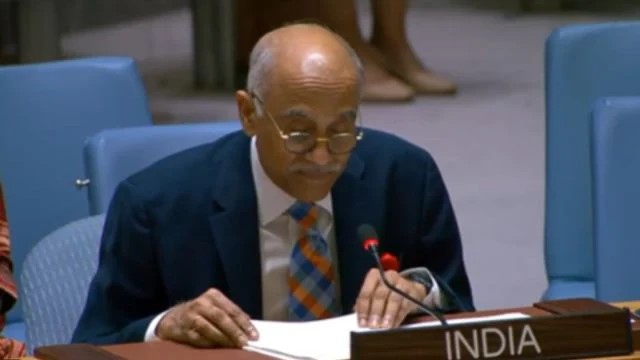
India Condemns Pakistan at UN Security Council Over ‘Systematic Genocide’ Allegations

 :
| Updated On: 07-Oct-2025 @ 11:53 am
:
| Updated On: 07-Oct-2025 @ 11:53 amSHARE
India has strongly condemned Pakistan at the United Nations Security Council (UNSC), accusing it of committing grave violations against its own population. During the Open Debate on Women, Peace, and Security, India’s Permanent Representative to the UN, Ambassador Parvathaneni Harish, delivered a powerful statement highlighting Pakistan’s actions, describing the country as one that “bombs its own people.” His remarks were aimed at drawing international attention to the systemic issues in Pakistan, particularly those affecting human rights, security, and the safety of women and vulnerable populations within its borders.
Ambassador Harish specifically accused Pakistan of engaging in “systematic genocide,” emphasizing that the country’s internal policies and actions have had devastating consequences for certain communities. He argued that Pakistan’s approach not only violates fundamental human rights but also undermines regional peace and stability. The statement suggested that these acts are part of a deliberate and sustained strategy by Pakistan to maintain control and suppress dissent, resulting in widespread suffering among its citizens. By framing Pakistan as a state that actively harms its own population, India sought to bring the spotlight on the urgent need for accountability and corrective measures.
The Indian representative also pointed out Pakistan’s use of “misdirection and hyperbole” to divert the international community’s attention from its actions. This tactic, according to Ambassador Harish, is designed to create confusion and shift focus away from the serious allegations of human rights violations and atrocities committed within Pakistan. By manipulating narratives and employing propaganda, Pakistan attempts to portray itself as a victim or as a country facing external pressures, thereby obscuring the reality of internal repression and violence. India’s statement highlighted the need for the global community to look beyond such attempts at obfuscation and hold Pakistan accountable for its actions.
Moreover, India’s condemnation at the UNSC emphasized the broader implications of Pakistan’s behavior on regional security and international peace. The focus on women, peace, and security during the debate underscored the specific vulnerabilities faced by women in conflict zones and under oppressive regimes. Ambassador Harish’s statement implied that Pakistan’s policies and actions have disproportionately affected women and other marginalized groups, contributing to a cycle of violence and instability that threatens not only domestic safety but also regional stability. By bringing this issue to the UNSC, India sought to ensure that the international community recognizes the human cost of Pakistan’s policies and engages in proactive measures to prevent further atrocities.
India’s statement at the UNSC was also a call to action for global accountability. By highlighting systematic violations and the deliberate strategies employed by Pakistan to mislead the international community, India urged member states to scrutinize Pakistan’s conduct and advocate for measures that ensure justice and protection for affected populations. Ambassador Harish stressed that transparency, vigilance, and international oversight are essential to preventing further human rights abuses and to promoting peace and security in South Asia.
In summary, India’s intervention at the UN Security Council presented Pakistan as a nation responsible for systemic violence against its own people, including acts that constitute “systematic genocide.” Ambassador Parvathaneni Harish condemned Pakistan’s reliance on misinformation and diversionary tactics to obscure its actions while emphasizing the importance of global attention and accountability. The statement drew attention to the human rights crisis within Pakistan, the disproportionate impact on women and vulnerable communities, and the broader implications for regional peace and security. By raising these issues in the UNSC debate on Women, Peace, and Security, India reinforced the need for international scrutiny, collective responsibility, and action to address violations and uphold fundamental human rights. The message underscored India’s commitment to advocating for justice, protecting human rights, and ensuring that the global community remains alert to threats posed by state-sponsored oppression and violence.
Overall, India’s remarks served as both a condemnation of Pakistan’s actions and a broader call for international vigilance and accountability, emphasizing that peace, security, and human rights must be central to the global agenda.